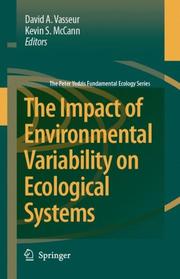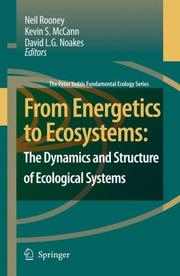| Listing 1 - 5 of 5 |
Sort by
|
Book
ISBN: 1283290715 9786613290717 1400840686 9781400840687 9780691134178 0691134170 9780691134185 0691134189 9781283290715 Year: 2012 Publisher: Princeton, NJ : Princeton University Press,
Abstract | Keywords | Export | Availability | Bookmark
 Loading...
Loading...Choose an application
- Reference Manager
- EndNote
- RefWorks (Direct export to RefWorks)
Human impacts are dramatically altering our natural ecosystems but the exact repercussions on ecological sustainability and function remain unclear. As a result, food web theory has experienced a proliferation of research seeking to address these critical areas. Arguing that the various recent and classical food web theories can be looked at collectively and in a highly consistent and testable way, Food Webs synthesizes and reconciles modern and classical perspectives into a general unified theory. Kevin McCann brings together outcomes from population-, community-, and ecosystem-level approaches under the common currency of energy or material fluxes. He shows that these approaches--often studied in isolation--all have the same general implications in terms of population dynamic stability. Specifically, increased fluxes of energy or material tend to destabilize populations, communities, and whole ecosystems. With this understanding, stabilizing structures at different levels of the ecological hierarchy can be identified and any population-, community-, or ecosystem-level structures that mute energy or material flow also stabilize systems dynamics. McCann uses this powerful general framework to discuss the effects of human impact on the stability and sustainability of ecological systems, and he demonstrates that there is clear empirical evidence that the structures supporting ecological systems have been dangerously eroded. Uniting the latest research on food webs with classical theories, this book will be a standard source in the understanding of natural food web functions.
SCIENCE / Life Sciences / Biology / General. --- SCIENCE / Life Sciences / Ecology. --- Biotic communities. --- Food chains (Ecology) --- Biocenoses --- Biocoenoses --- Biogeoecology --- Biological communities --- Biomes --- Biotic community ecology --- Communities, Biotic --- Community ecology, Biotic --- Ecological communities --- Ecosystems --- Natural communities --- Ecology --- Population biology --- Food webs (Ecology) --- Trophic ecology --- Animals --- Nutrient cycles --- Food --- Canadian Shield. --- Gershgorin discs. --- Hopf bifurcation. --- Robert Holt. --- adaptive behavior. --- alternative stable states. --- aquatic microcosm. --- asynchrony. --- bifurcation. --- bird feeder effect. --- body size. --- competition. --- consumers. --- consumerвesource dynamics. --- consumerвesource interactions. --- consumerвesource models. --- consumerвesource theory. --- continuous logistic growth models. --- detritus. --- diamond food web. --- discrete equations. --- dynamical systems theory. --- dynamical systems. --- ecological instability. --- ecological stability. --- ecological systems. --- ecosystem collapse. --- ecosystem dynamics. --- ecosystem size. --- ecosystem stability. --- ecosystems. --- eigenvalue. --- equilibrium steady state. --- equilibrium. --- excitable interactions. --- food chains. --- food web structure. --- food web theory. --- food webs. --- foraging. --- generalism. --- generalists. --- grazing. --- habitat. --- human impacts. --- interaction strength. --- intraguild predation model. --- lags. --- lake trout. --- local stability analysis. --- matrix theory. --- microcosm experiments. --- mobile adaptive predators. --- modular theory. --- module. --- motif. --- natural ecosystems. --- nature. --- nonequilibrium dynamics. --- nonequilibrium steady state. --- nonexcitable interactions. --- nutrient decomposition. --- nutrient recycling. --- nutrients. --- omnivory. --- oscillation. --- oscillatory decay. --- phase space. --- population dynamics. --- population growth. --- population models. --- population structure. --- populations. --- resources. --- space. --- species. --- stage structure. --- stage-structured lags. --- subsidies. --- subsystems. --- sustainability. --- time series. --- trade-offs. --- traits. --- whole-community approach. --- whole-system matrix.
Digital
ISBN: 9781400840687 9780691134185 Year: 2011 Publisher: Princeton, N.J. Princeton University Press
Abstract | Keywords | Export | Availability | Bookmark
 Loading...
Loading...Choose an application
- Reference Manager
- EndNote
- RefWorks (Direct export to RefWorks)
Book
ISBN: 9780198824282 9780198824299 0198824297 0198824289 Year: 2020 Publisher: Oxford: Oxford university press,
Abstract | Keywords | Export | Availability | Bookmark
 Loading...
Loading...Choose an application
- Reference Manager
- EndNote
- RefWorks (Direct export to RefWorks)
"This book continues the authoritative and established edited series of theoretical ecology books initiated by Robert May which helped pave the way for ecology to become a more robust theoretical science, encouraging the modern biologist to better understand the mathematics behind their theories. This latest instalment in the Theoretical Ecology series builds on the legacy of its predecessors with a completely new set of contributions. Rather than placing emphasis on the historical ideas in theoretical ecology, the editors have encouraged each contribution to: i) synthesize historical theoretical ideas within modern frameworks that have emerged in the last ten to twenty years (e.g., bridging population interactions to whole food webs); ii) describe novel theory that has emerged in the last twenty years from historical empirical areas (e.g., macro-ecology); and iii) cover the booming area of theoretical ecological applications (e.g., disease theory and global change theory). The result is a forward-looking synthesis that will help guide the field through a further decade of development and discovery"--
Ecology. --- Écologie. --- Écologie.

ISBN: 1280864982 9786610864980 1402058519 1402058500 9048174570 Year: 2007 Publisher: Dordrecht ; London : Springer,
Abstract | Keywords | Export | Availability | Bookmark
 Loading...
Loading...Choose an application
- Reference Manager
- EndNote
- RefWorks (Direct export to RefWorks)
Fluctuations in the environmental conditions impacting life are ubiquitous. These fluctuations induce changes in the vital processes occurring within individual organisms (such as cellular metabolism) and the ecological processes occurring among individuals (such as competition, mutualism, and predation), ultimately leading to observable fluctuations in the commonly measured characteristics of ecological systems. From a very simple perspective, these processes are all modulators of environmental variability. We might best be able to understand the final form of this modulation – the impact of environmental variability on ecological systems - by building from an understanding of the responses of these life processes in isolation to an understanding of their responses in harmony. The impact of environmental variability on ecological systems is an issue that has been at the forefront of ecological research for many years. Research is taking place on many fronts, including theoretical mathematical based analyses, natural ecosystem observation and experimentation. This book brings together contributions from these three fronts to provide readers with a comprehensive look at the challenges for ecological systems and ecological research alike.
Ecological assessment (Biology) --- Ecological disturbances. --- Global environmental change. --- Biotic communities. --- Biocenoses --- Biocoenoses --- Biogeoecology --- Biological communities --- Biomes --- Biotic community ecology --- Communities, Biotic --- Community ecology, Biotic --- Ecological communities --- Ecosystems --- Natural communities --- Ecology --- Population biology --- Environmental change, Global --- Global change, Environmental --- Global environmental changes --- Change --- Disturbance ecology --- Disturbances, Ecological --- Ecological perturbations --- Ecosystem disturbances --- Ecosystem perturbations --- Environmental disturbances --- Environmental perturbations --- Perturbations, Ecological --- Biological evaluation of environmental impacts --- Ecological damage assessment (Biology) --- Applied ecology --- Environmental impact analysis --- Nature --- Ecological surveys --- Effect of human beings on --- Ecology. --- Environmental sciences. --- Endangered ecosystems. --- Aquatic biology. --- Biodiversity. --- Environment, general. --- Theoretical Ecology/Statistics. --- Ecosystems. --- Freshwater & Marine Ecology. --- Biological diversification --- Biological diversity --- Biotic diversity --- Diversification, Biological --- Diversity, Biological --- Biology --- Biocomplexity --- Ecological heterogeneity --- Numbers of species --- Hydrobiology --- Water biology --- Aquatic sciences --- Threatened ecosystems --- Biotic communities --- Nature conservation --- Environmental science --- Science --- Balance of nature --- Bionomics --- Ecological processes --- Ecological science --- Ecological sciences --- Environment --- Environmental biology --- Oecology --- Environmental sciences --- Ecology . --- Environment. --- Aquatic ecology . --- Aquatic biology

ISBN: 9781402053368 1402053363 Year: 2007 Publisher: Dordrecht: Springer,
Abstract | Keywords | Export | Availability | Bookmark
 Loading...
Loading...Choose an application
- Reference Manager
- EndNote
- RefWorks (Direct export to RefWorks)
| Listing 1 - 5 of 5 |
Sort by
|

 Search
Search Feedback
Feedback About UniCat
About UniCat  Help
Help News
News